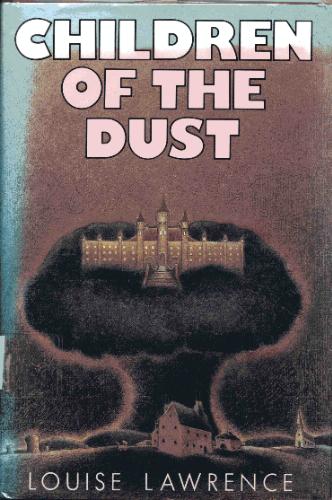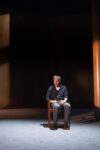There is a distinct anxiety to revisiting something you loved as a child, particularly a book that you have written into the narrative of your politics, your personality, a text that you believe to have been instrumental in writing you. I wanted to re-read a book that very few of my peers recognised, Children of the Dust, and I wanted something to happen while I was reading it (I was terrified that perhaps nothing would happen). This is why I decided to read it in bed with him.
Children of the Dust was written by a fairly obscure English writer, Louise Lawrence, in 1985 and tells the story of the reverberations of nuclear war from the point of view of three generations of survivors of this absolute violence. I wonder before I start writing if my generation (I was born in 1983) is the last one to grow up knowing what ‘nuclear winter’ means. I was raised, like children of the 60s and 70s, with the fear of apocalypse, a fundamental, corporeal end of the world (or, at least, the centers of the world) as something that could happen suddenly, tomorrow. This paranoia was linked to disaster and death, the loss of ‘democracy,’ but also the possibility for a new order, perhaps an end of capitalism as well as an end of the world.
In the eighties the British government prepared a set of guidelines for what civilians should do in the event of nuclear attack: seal one room of your house against the radiation; build a shelter inside, and don’t come out until it’s safe. Already the room felt like a prison, Lawrence writes. Sarah felt sick at the thought of it. They would have to live with the stink, all of them together in the closed-in room.
He reads clearly and slowly and faithfully with an accent that fits the book, which moves around the English countryside.
I, however, am prone to adulterous readings. I stop to interject, to complain about things, stumble over the names of small English towns, to comment on how strange it was to feel that this London of the book is in fact a real place (I imagine the fear of children reading the book in London, in a center and thus a target) as opposed to a fictional space designed as a backdrop for books and films and adventures and Christmas cards. Snow and cold and holly and robins at Christmas still feel fictional to me, having grown up in South Africa, even though this is a fiction that I am squirming inside of now. I leave things out.
But he laughed when the dog died. He laughed at the over-dramatization of the prose and again when Veronica, Sarah’s stepmother, becomes sick. As a child I was shocked when Buster died with a yelp so easily and so early on in the book.
Rereading Children of the Dust I recall this particular shock only as nostalgia, mediation, distance — an image of how I felt, once. At times, though, the horror reverberates, shudders in a post-traumatic jolt. Moments in the text that find me shocked again, a child again; petrified:
- Sex between Catherine and Farmer Johnson. That a young child taken to an adult to be cared for by her sister, Sarah, who is dying from radiation poisoning weeks after the bomb falls, should then be fucked by the big man, the grown man, over and over and over again. The loveliness of the valley, the sanctity of its life, fled to a hideous reality. It was horrible, unthinkable . . . sexual intercourse between a fourteen-year-old girl and a forty-year-old man . . . breeding like animals, having no choice, pregnancy after pregnancy, and all the children dying. Catherine’s great swollen stomach seemed suddenly obscene, the result of one more sordid act of conception.
- Lilith laying the babies that would be her brothers and sisters out in the snow to die, since she knew that they were going to anyway.
- Lilith’s sister who does survive, Catherine and Farmer Johnson’s child who is healthy, but not human — the shock of albino fur, white eyes, the shudder at a mutant child; which is also delight . . .
Horrified, I am still able to take out pieces of the text as I am reading it; live editing, negating. Some things I do not read out loud, passages which frame the book; annoyingly, for me.
- Sarah looked up at the blue heavenly sky. In the end people turned to God. But the death that would come was nothing to do with Him. He, and the world, and the whole of creation were about to be destroyed.
- Through her he could see forward into the future . . . evolution, mutation, mind over matter, space and stars. She maintained the continuity of creation. For her blind Kate had survived and Simon had come here, each of them part of an unbroken perfect pattern that bestowed a meaning upon everything, little fragments of the mind of God which nothing could destroy.
Some parts of the text that I paused after speaking, commented on, laughed with, took pleasure in, read:
- ‘When the time comes we’ll recruit outside workers,’ Erica said.
‘Suppose they don’t want to be recruited?’
‘Oh come on, Bill! Everyone has to work for a living.’
‘They are working, woman! They’re working for themselves! Working to survive in conditions as we have never known! What right do we have to expect them to give up their own enterprises and work for us?‘ - ‘No one should have power over other people! We’ve seen what governments and men like MacAllister can do! They not only destroy people’s lives, but the whole damned world!’
- Ophelia had not been present when Dwight found the spray can and wrote the message on the wall . . . GENERAL MACALLISTER IS A FASCIST PIG . . . in huge blood red letters in the pale green corridor. He is reading this line out loud and he approves, we approve. When he came over bruised and beaten by the police, when he was so angry . . . When I said ‘I just want to be inside you.’
- As for the rest of Bill Harnden’s students who might share similar views . . . General MacAllister came personally to the schoolroom to deliver a lecture. For an hour and a half he droned on about dangerous left-wing ideals and socialist principles, about the threat to democracy which had resulted in nuclear war, and why subversive political activity would not be tolerated now. There was no such thing as freedom without order, General MacAllister said, just degeneration into lawless anarchy and social chaos.
“Yes!” He smiles and we laugh. This same week that we were reading Children of the Dust the universities in London try to make occupations on campus illegal. Security drag people by their hair, they choke him. Someone hits me on the back with a baton and there is a puddle of the blood of a black boy on crutches on the floor; total policing.
- ‘Then the system is immoral!’ Dwight said furiously. ‘It’s blasted serfdom! Class division! History repeating itself! What gives us the right to set ourselves up over them? Let them do all the donkey work and take what we want?’ . . . Erica tried to tell him. What belonged to the government belonged to all the people (we scoff). That way resources would be shared equally and not be enjoyed by just a few. That was not how it had been before the holocaust, Dwight argued.
- Erica shrugged. The requisitioning of supplies by the government was common practice during a national crisis, she said. And it was a fact of life, even among animal communities that some were born to lead and others to follow. Dwight should be thankful he had been born in a privileged position inside the bunker, she said.
“I stress,” Boris Johnson says in November 2013, “I don’t believe that economic equality is possible; indeed some measure of inequality is essential for the spirit of envy and keeping up with the Joneses that is, like greed, a valuable spur to economic activity.”
Dwight sets fire to the trucks that have gone to ‘requisition’ the outsiders’ cattle and runs away into the wild; what a babe. ‘The true spirit of communism,’ her father murmured. (Of course in running away from the bunker Dwight also runs from Ophelia, breaking her heart for the revolution.)
- They lacked the means for successfully breeding and raising livestock and women, who had not rated very highly on the government’s list of priority survivors, suddenly assumed a significance.
There are no manmutants in Children of the Dust. Full-body, silver-furred, white-eyed telepathic outsiders are the only chance for the posthuman race, and all the named mutants are feminine; descended from Lilith, too, who Adam will be husband to first, made from the same earth, expelled because she would not be subservient to him, sit beneath his rib; this is baby-eating sex blood vampire demon Lilith who is kicked out of paradise because she will not be raped.
Lilith’s sister Alison is born the day that Dwight sets fire to the truck that will requisition their cattle. Alison is named after Dwight and Dwight’s father, General Alison, who is in charge of the cattle-stealing operation. Alison’s daughter, Lilith’s niece, Laura, is the heroine of the third part of the story even though it is called Simon and she is the mutant who can control wild beasts with her mind and who Simon hates because she is better than him and because she can control the men, the humans, the scientists like dogs, if we have to but who saves him and who can ride a horse and who walks with her deformities showing. Lilith’s human mother, Blind Kate, could see before when she was called Catherine and who fucked farmer Johnson because that was all that could be done and who had baby after baby that was put out to die in the snow and who when she was small sat under her tiny table and would not drink the contaminated water and watched her mother and her brother die of radiation sickness and was the reason that Catherine’s sister Sarah did not suicide at the beginning, but lived through the dust and the vomiting and the bleeding sores around her mouth and the death of her only friend and shooting the dog and who, only a child herself, held it all together so that Catherine and Lilith and Alison and Laura could survive and who took Catherine to her rapist and then did die, herself.
- It had to be Sarah who put aside everything she felt, who dug deeper than grief or worry into the still quiet centre of herself . . .
We know how she feels; we who have stood in a space where we’ve had to make sure that others survive, a knife on her throat again (and again), a threat of death and worse than death, the lump of calm in Sarah’s stomach that will allow her sister Catherine to live to grow tumour after tumour in her own womb then to give birth to two whole beings with the seed of Johnson who fucks her and maybe all of the other girls too and is their saviour.
Every child is born of trauma, but the mutant children wear this wound — inherited from their mother, their aunt, the earth that burns with radiation, the deaths of millions of others — as clothing, as being, as skin and misshapen flesh, a pockmarked subjectivity. Their openness comes from corporeal ruptures, burning corpses, a young girl’s body filled with cum. It does not seek to be open; it is not a liberal reaching-outwards, a desire for consensus or difference or liberation. Theirs is a radical openness, a mutation that has been produced to keep the outside at bay — a bodily disguise that crafts mass empathy, collectivity; the mutant telepathy of the survivor, which will drive their brave new leaderless world.
The mutant always stands in for the Other; the one who is different, who tries to pass, who is reviled, harmed, hated, ‘cured’ — the queer body, the trans* body, the body that threatens hegemony becomes the body that is notquite and morethan human.
- Simon held out his hand, inviting her, a mutant girl with white eyes and albino fur. It no longer mattered what she was, or how different. In the past the inability of people to reconcile themselves to each other’s differences had led to confrontation, tyranny, subjugation and war. Not any more did Simon see the need for that. Diversity was necessary and natural . . .
But it is not just that the mutant stands in for queerness, otherness (the outsiders). Rather, mutation itself becomes a queering strategy for post-capitalist, posthuman survival. Technologies of othering play out on the soft skins of survivors’ children — not just through a corporeal transmutation, but an affective metamorphosis. The prelingual, abject feminine monsters have finally solved the problem of communication without You — the mutual permeation of minds, the contorted vision.
The children of the dust come from the violence of government, of democracy, of war, of disease, of a brutalised planet and the pain of a woman’s repeated horrific birthings. But they have adapted, have changed, are better — atechnological cyborgs, queer communist mutants; the future.
The whole time that he is reading I like to play with his nipple ring, moving it up and down; later biting it softly while we penetrate each other. I wonder what will happen if I pull too hard, what would happen if I were to make him bleed, while we are in bed together, trying to survive.
This post may contain affiliate links.








